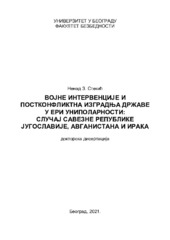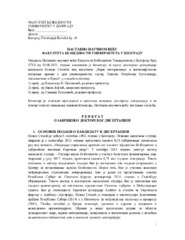Приказ основних података о дисертацији
Војне интервенције и постконфликтна изградња државе у ери униполарности: случај Савезне Републике Југославије, Авганистана и Ирака
Military interventions and postconflict statebuilding in a unipolar era : cases of Federal Republic of Yugoslavia, Afganistan, and Iraq
| dc.contributor.advisor | Rokvić, Vanja | |
| dc.contributor.other | Cvetković, Vladimir N. | |
| dc.contributor.other | Jeftić, Zoran | |
| dc.contributor.other | Tatalović, Siniša | |
| dc.creator | Stekić, Nenad Z. | |
| dc.date.accessioned | 2022-11-12T14:22:19Z | |
| dc.date.available | 2022-11-12T14:22:19Z | |
| dc.date.issued | 2022-02-02 | |
| dc.identifier.uri | https://eteze.bg.ac.rs/application/showtheses?thesesId=8821 | |
| dc.identifier.uri | https://fedorabg.bg.ac.rs/fedora/get/o:26992/bdef:Content/download | |
| dc.identifier.uri | https://plus.cobiss.net/cobiss/sr/sr/bib/51727369 | |
| dc.identifier.uri | https://nardus.mpn.gov.rs/handle/123456789/20830 | |
| dc.description.abstract | Ова дисертација истражује ефекте војних интервенција спроведених у ери униполарности на постконфликтни процес изградње државе, оригиналним постулатом обрнуте узрочности међу варијаблама теорије демократског мира – „унутрашње варијабле“ и оружаног сукоба. Квалитативно истраживање обухвата три студије случаја војног интервенционизма испољеног против тадашње Савезне Републике Југославије (СРЈ) 1999, Авганистана 2001. и Ирака 2003. и наставља се на временски период од шест година након сваке појединачне војне интервенције. У основи овог истраживања налазе се три зависне варијабле које уједно чине елементе постконфликтне изградње државе: динамика типа политичког режима, консолидација институција сектора безбедности и билатералне везе са Сједињеним Америчким Државама (САД). Полазна претпоставка упућује да су војне интервенције САД имале пресудан утицај на елементе постоконфликтне изградње СРЈ, Авганистана и Ирака. Општа хипотеза овог истраживања рашчлањена је на три посебне хипотезе о ефектима војних интервенција (независна варијабла) на динамику типа политичког режима, консолидацију институција сектора безбедности и билатералне везе са САД (зависне варијабле). Њихова конкретизација укључила је анализу актера изградње државе у матрицу Барнет-Фанг-Цирхеровог (БФЦ) модела, који наглашава значај стратешких интеракција између интервенишућег актера, послератних влада и такозваних „секундарних елита“. Применом добијених увида из студија случаја на БФЦ модел изградње државе потврђен је теоријски постулат инверзног демократског мира и тиме општа хипотеза дисертације. Потврђене су и претпоставке о динамици типа политичког режима и консолидацији сектора безбедности, док су претпоставке о квалитету билатералних односа са САД потврђене делимично. | sr |
| dc.description.abstract | This dissertation explores the effects of unipolar era military interventions to postconflict statebuilding processes, applying the original postulate of reversed causality among the variables of Democratic Peace Theory – political regime type and armed conflicts. This qualitative research involves three case studies of military interventionism conducted against the then Federal Republic of Yugoslavia (1999), Afghanistan (2001), and Iraq (2003) and spreads across the period of six years after each individual military intervention was initiated. At the core of this research are three dependent variables that constitute postconflict statebuilding: dynamic of political regime type, consolidation of security sector institutions, and bilateral ties between the USA with the countries covered by this research. The initial assumption is that the US military interventions had a decisive influence on the elements of the postconflict statebuilding of FR Yugoslavia, Afghanistan, and Iraq. The general hypothesis is divided into three specific hypotheses about the effects of military interventions (independent variable) on the dynamics of the identified dependent variables. Their concretization involves statebuilding actors analysis within the matrix of the Barnett-Fang-Zürcher (BFZ) model, which emphasizes the importance of strategic interactions between the intervening actor, post-war governments, and the so-called “secondary elites”. By applying the insights obtained from the case studies to the BFZ model, the theoretical postulate of inverse democratic peace and thus the general hypothesis was confirmed. Assumptions on the dynamics of the type of political regime and consolidation of the security sector were also confirmed, while assumptions on the quality of bilateral relations with the USA were partially corroborated. | en |
| dc.format | application/pdf | |
| dc.language | sr | |
| dc.publisher | Универзитет у Београду, Факултет безбедности | sr |
| dc.rights | openAccess | en |
| dc.rights.uri | https://creativecommons.org/licenses/by-nc-sa/4.0/ | |
| dc.source | Универзитет у Београду | sr |
| dc.subject | војне интервенције | sr |
| dc.subject | military interventions | en |
| dc.subject | postconflict statebuilding | en |
| dc.subject | Democratic Peace Theory | en |
| dc.subject | unipolarity | en |
| dc.subject | FR Yugoslavia | en |
| dc.subject | Afghanistan | en |
| dc.subject | Iraq | en |
| dc.subject | постконфликтна изградња државе | sr |
| dc.subject | теорија демократског мира | sr |
| dc.subject | униполарност | sr |
| dc.subject | СР Југославија | sr |
| dc.subject | Авганистан | sr |
| dc.subject | Ирак | sr |
| dc.title | Војне интервенције и постконфликтна изградња државе у ери униполарности: случај Савезне Републике Југославије, Авганистана и Ирака | sr |
| dc.title.alternative | Military interventions and postconflict statebuilding in a unipolar era : cases of Federal Republic of Yugoslavia, Afganistan, and Iraq | en |
| dc.type | doctoralThesis | |
| dc.rights.license | BY-NC-SA | |
| dc.identifier.fulltext | http://nardus.mpn.gov.rs/bitstream/id/146980/Disertacija_12747.pdf | |
| dc.identifier.fulltext | http://nardus.mpn.gov.rs/bitstream/id/152555/Referat.pdf | |
| dc.identifier.rcub | https://hdl.handle.net/21.15107/rcub_nardus_20830 |



